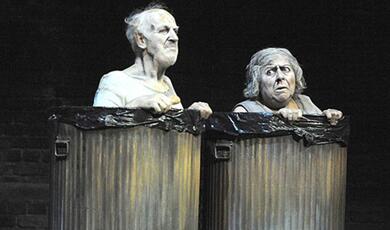13 May 2014
How do Novels Beguile?
Professor Belinda Jack
This is a subject of fundamental importance to would-be novelists. I am told, anecdotally, that there are more people writing novels in contemporary Italy than there are people reading novels! And here in the UK the creative writing industry is a growing one. To write a successful novel you have to know how to beguile your readers. You have to provide a semblance of life such that your characters and their lives matter to your readers. The more they matter, the more the novel qualifies for the ultimate imprimatur - at least commercially that is - ‘hard to put down’.
There is no shortage of books about creative writing and the same is true of creative writing courses, whether they be a day workshop, a weekend or something longer. Masters degrees in creative writing – which have rapidly proliferated - are generally two-year courses, full-time, four years part-time. And however much the death of the book is prophesised by the media in the face of new technologies, the Internet in particular, there is no sign that interest in the novel and the creative writing process is going to wane. Mr Waterstone, of the chain of bookshops of the same name, recently reported a decline in the sale of ebooks of all genres, and a concomitant rise in the sales of good old paperbacks, the vast majority works of fiction.
Those who’d like to write fiction are naturally drawn to any advice on offer. But I doubt that much of it really makes much of a difference. All it does is postpone putting pen to paper or the fingers to keyboard and distract the would-be author from reading the kinds of things that do make a difference. It’s rather like attentive reading of recipes in the Sunday papers that one knows very well one will never try. It’s an easy substitute for cooking, just as reading books about how to write fiction is an easy substitute for giving it a go.
So how does one learn how novels beguile? Italo Calvino’s collection of essays, Why Read the Classics? is a wonderful celebration of classic works of fiction from The Odyssey to the modern novels of Pavese, who was a generation older than Calvino himself. One obvious piece of advice to would-be authors is to read the classics. I wouldn’t advocate quite such a narrow and perhaps conservative preparation for the aspiring writer. But I would put the emphasis on reading, particularly works of fiction that are similar to the kinds of novels the aspiring writer would like to write. I’m not sure that attempting to follow what have become the dogmas of the creative writing industry is going to help much. In fact it may knock the last bit of originality out of him or her. These strictures would include:
‘the opening must be a hook’
‘show don’t tell’
‘use nouns and verbs but be sparing with adjectives and adverbs’
‘do not ‘overwrite’ (provide superfluous detail)
‘avoid qualifiers like “rather” and “very”’
‘use figures of speech sparingly as too many metaphors, for example, in quick succession, confuse’
‘kill your darlings’ (those phrases that delight you but which may not really belong)
‘avoid repetition’
‘avoid foreign vocabulary’
In addition, what many creative writing guides do is to reduce the novel to its alleged constituent components:
character, setting, description, point of view, dialogue, and so on.
But this is to separate out aspects of the novel in a way which is, of course, wholly artificial. It is likely to encourage the would-be novelist to write in a way that is equally artificial.
The openings of a great many classic nineteenth-century novels don’t ‘hook’ or beguile the modern reader. Here is the most famous bad opening in literature. In fact it has attracted the utmost ignominy as it has become the title for an annual fiction-writing competition where entrants have to submit bad first lines.
"It was a dark and stormy night; the rain fell in torrents, except at occasional intervals, when it was checked by a violent gust of wind which swept up the streets (for it is in London that our scene lies), rattling along the housetops, and fiercely agitating the scanty flame of the lamps that struggled against the darkness,” from Edward George Bulwer-Lytton’s 1830 novel Paul Clifford, that has set the standard for bad opening lines for close to two hundred years.
The requirement to ‘hook’ the reader at the outset is one of the dogmas of the creative writing industry that I accept. We have become ever more impatient as readers, living as we do, in an age of multiple distractions.
The interesting thing is that ‘hooking’ your reader often involves contravening other dogmas. I’d like to consider a number of openings which I think work supremely well.
Once upon a time, there was a woman who discovered she had turned into the wrong person.
Back When We Were Grownups, Anne Tyler (2001)
There’s a ‘shock value’ about this opening. It depends on stylistic incompatibility. ‘Once upon a time’ is an archaic idiom from the 12th century. By the sixteenth it was well established as the conventional opening to a children’s story and immediately on reading it we are not necessarily yet ‘beguiled’, but certainly lulled. It is comfortingly familiar and tells us that a story is about to be told. But it’s an odd expression as I mentioned in my first lecture. Why ‘upon’. How can something be ‘upon’ a time? The preposition seems wrong. Things happen ‘at’ a time, or ‘in’ times gone by. We arrive, we hope, ‘on’ time. But ‘upon’ - if we reflect on it rather than skimming over it because of its familiarity - seems odd. What Tyler has done is to use the archaic, and therefore somewhat strange yet familiar, expression, ‘once upon a time’ and has it introduce a Kafkaesque report, ‘there was a woman who discovered she had turned into the wrong person’.
In Franz Kafka’s Metamorphosis (1951), the protagonist, Gregor, is introduced in the opening sentence:
When Gregor Samsa woke up one morning from unsettling dreams, he found himself changed in his bed into a monstrous vermin.
Monstrous vermin is the literal translation of ungeheures Ungeziefer, although it does not reproduce the alliteration of the original (that’s actually some of what makes this first sentence so startling in German). In English the emphasis in a sentence is generally at the beginning and at the end. The English translation works well here as the shock is the fact that he has changed ‘into a monstrous vermin’. We are certainly hooked, if not yet beguiled. There is a mystery we want to see solved: what on earth has happened and how will Gregor deal with the extraordinary transformation of his self?
One way of gaining perspective on the openings of classic novels is to see how film-makers construct the opening of films based on these novels.
F. Scott Fitzgerald’s famous novel, The Great Gatsby (1925), opens with the brilliant sentence:
In my younger and more vulnerable years my father gave me some advice that I've been turning over in my mind ever since.
There are adjectives (younger, vulnerable) and qualifiers here (more, some, ever) which lead to a degree of ‘over-writing’; all these linguistic features are discouraged by creative writing manuals, but this is a great opening. How does it work? Rather like the Tyler opening there is a marked contrast between the way the sentence begins – and the way it ends. And there’s an inversion of common word order. A more likely syntax would be, ‘I’ve been turning over in my mind advice my father gave me...’. But the irony and humour would then be lost. As I mentioned earlier, emphasis in the English language generally falls at the beginning and end of the sentence. By ordering his opening sentence as he has, Scott Fitzgerald gives us a delightful surprise. Paternal advice, given some years earlier when the narrator was young and vulnerable has not, by implication, been taken. When is it ever? Well I can only speak of maternal advice which I’ve come to see too late in my life as a mother – as counter-productive! Do we expect the narrator, now more mature, suddenly to see the wisdom of his father’s advice? We do not. The speaker manages to convey an air of reasonableness – and somewhat stubborn independence. This is an opening that ‘hooks’ despite breaking a number of the rules.
The film-makers of the opening of C.S. Lewis’s Voyage of the Dawn Treader took a very different line. Here is the opening clip:
The opening of the novel is far less visually dramatic – it’s words not images! And it depends principally on a qualifier:
‘There was a boy called Eustace Clarence Scrubb, and he almost [my emphasis] deserved it.’ (The Voyage of the Dawn Treader, C. S. Lewis, 1952) It’s a dreadful name for a child to bear. Lewis has crafted it very carefully in terms of the constituent syllables and half-rhymes. ‘Eustace’ and ‘Clarence’ are both made up of two syllables, this lends emphasis to ‘Scrubb’, being made up of a single syllable. ‘Eustace’ and ‘Clarence’ have terminal half-rhymes which suggests something slightly superfluous about being saddled with both first names. And ‘Scrubb’ is a homophone for ‘scrub’, a verb we associate with drudgery and, perhaps, inferior social position. As Lewis wrote in his essay, An Experiment in Criticism, ‘From every sentence we read, our inner ear receives satisfaction or the reverse. On the strength of this experience we pronounce the author’s rhythm good or bad. Lewis’s own, here, is exemplary.
But it’s the qualifier, ‘almost’ that is the real master stroke here. We can’t write Eustace off because he didn’t altogether deserve the name. We might appeal to a Christian analogy and say that the narrator doesn’t think him beyond redemption. We are immediately intrigued and want to know more about Eustace. We are ‘hooked’. We also sense a degree of compassion on the part of the narrator. We feel in reassuring avuncular company.
Jane Austen is surely one of the greatest novelists in terms of opening lines. I’d like to consider one that is slightly less well known than the first lines of Pride and Prejudice:
Emma Woodhouse, handsome, clever, and rich, with a comfortable home and happy disposition, seemed to unite some of the best blessings of existence; and had lived nearly twenty-one years in the world with very little to distress or vex her. (Emma, Jane Austen, 1815)
There are a good many adjectives here . Some would strongly advise against these. But it’s a wonderful opening. The alliteration, ‘home and happy’, ‘best blessings’ adds a degree of exaggeration, suggestive of irony. Just as Lewis has deftly used the qualifier ‘almost’, so Austen uses ‘nearly’. The subtle hint it provides is that on coming of age, when Emma is twenty-one, life will become more difficult. The phrase, ‘so far so good...’ comes to mind and we’re hooked. What is going to become of her? Austen’s gentle irony can be likened to the avuncular tone achieved by Lewis. We know all will be well in the end, so we can enjoy the suspense. As with oral story-telling, we’re not alone; watching films, we are not in the reassuring company of the film-maker.
The film version of Austen’s Emma lacks the suspense and the gentle irony.
[Film extract]
Lewis Carrol gets us caught up in his fictions in a rather different way. Here’s the opening of Alice’s Adventures in Wonderland:
Alice was beginning to get very tired of sitting by her sister on the riverbank, and of having nothing to do: once or twice she had peeped into the book her sister was reading, but it had no pictures or conversations in it, ‘and what is the use of a book’, thought Alice, ‘without pictures or conversation?’
How does this opening work? The syntax, ‘beginning to get very tired’ is suggestive of the slightly petulant child. There’s another qualifier, ‘very’, and this seems exaggerated. The idea of ‘beginning to get very tired’ lacks the lucidity of adult use of language. Now, we don’t think of sitting on a riverbank as ‘tiring’, but Alice uses the word to suggest boredom. This is reinforced by the fact that she has ‘nothing to do’. As an adult we might consider sitting on a riverbank as what we’re ‘doing’, but as a child, contemplation is rarely seen as ‘something to do’. It is not, to the child’s mind, an ‘activity’. What further suggests the thought processes of a child, is the deft use of punctuation. This is a single sentence and its very length is suggestive of Alice’s restlessness. The sentence seems to go on and on, just as the uneventful business of sitting on the riverbank seems, to Alice, to be going on and on. The narrative technique is deceptive. We are only told what Alice is thinking at the end, within inverted commas. But the use of language from the outset is richly suggestive of a child’s perspective on things. Austen suggests, by her use of the qualifier, ‘nearly’, that Emma’s life is about to change and we read on to find out in what ways. Similarly, we feel that having lasted to the end of a very long sentence, Alice should be rewarded by some exciting development which, of course, she is.
The openings I’ve discussed are, to my mind, some of the most beguiling. But novels don’t simply beguile as a function of their beginnings, of course, however much they instantly hook us. Those of you who were at my first lecture may remember my mentioning Italo Calvino’s magnificent novel, Mr Palomar in which a number of passages seem to me to offer many aspects of the novel in microcosm. I’d like to use it to demonstrate how different aspects of the novel may beguile in unexpected, sometimes paradoxical ways:
Mr Palomar is standing in a queue in a cheese shop, in Paris. He wants to buy certain goats’ cheeses that are preserved in oil in little transparent containers and spiced with various herbs and condiments. The queue of customers moves along a counter where samples of the most unusual and varied specialities are displayed. This is a shop whose range seems meant to exemplify every conceivable form of dairy product; the very sign, "Spécialités fromagères," with that rare archaic or vernacular adjective, advises that here is guarded the legacy of a knowledge accumulated by a civilization through all its history and geography.
I find this passage captivating. By the time I get to the end I can smell the cheeses and feel that particular restlessness that comes over one when you’re queuing in a shop, an impatience which is kept in check by contemplating one’s surroundings. But let’s consider the dos and don’ts: does the opening sentence immediately beguile the reader, in the way that some creative writing gurus insist it should? Isn’t it all every-day and spectacularly lacking in action? Isn’t standing in a queue a metaphor for boredom, and devoid of all drama? Or does its very static quality provide immediate suspense: something is about to happen, as in the opening of Alice? The second sentence is surely in danger of being accused of ‘over-writing’. Do we need to know so many details about not just one goat’s cheese but goats’ cheeses in the plural: the ‘containers’ are both ‘little’ and ‘transparent’; the ‘oil’ is ‘spiced with various herbs and condiments’? What exactly is the difference between ‘herbs’ and ‘condiments’? Isn’t there significant overlap? And they are ‘spiced’ too. All this is hard to swallow, so to speak! Far from using adjectives sparingly, Calvino describes the cheese-samples as both ‘unusual’ and ‘varied’, at the same time as using a shunned modifier, ‘most’. The range doesn’t simply ‘exemplify every dairy product’, rather ‘it seems meant to exemplify every conceivable form of dairy product’. Then we have forbidden foreign terms, ‘spécialités fromagères’, explicitly qualified by further adjectives - ‘archaic’ and ‘vernacular’. Then we move into the dangerous territory of figurative language. The ‘very sign’ is a symbol of a ‘legacy of a knowledge accumulated by a civilization through all its history and geography’ and the legacy is ‘guarded’ (another metaphor) within the sanctuary of the cheese shop in which Mr Palomar waits his turn to be served. There’s a good deal of ‘telling’ (rather than ‘showing’) here – and the proffering of opinion.
So why do I propose this as a wonderful literary accomplishment, despite the fact that it breaks so many of the rules? There are aspects of reading that often remain subconscious. Its counterpart is in advertising, as I explored in my last lecture. ‘Subliminal advertising’ is the use of images to influence consumers' responses without their being consciously aware of them. So what are the comparable ‘subliminal’ techniques that Calvino uses to beguile us in this passage? Certain images dominate through the use of repetition: ‘queue’ used twice and combined with ‘along’, are linear images. This ties in nicely with the ‘time-line’ of history that we lead up to later in the passage. These carry the reader along through space and time in contrast to the physical stasis of Mr Palomar. There is plenty of vocabulary that suggests completeness, the comprehensive, excess: ‘the most unusual and varied’, ‘every conceivable form’, ‘accumulated’. The effect is to overwhelm the reader just as Mr Palomar is overwhelmed by the array of cheeses and no doubt their different smells too. The ‘rare archaic’ language of the sign blurs with the ‘rarity’ of some of the cheeses. In terms of tone, Calvino has used what one might term ‘reverse bathos’. Instead of moving from the exalted to the commonplace, we go from the ordinary to the sublime. We begin with the humdrum, queuing in a shop. Just a few sentences later, however, the shop has become a museum, or something more private, a carefully guarded secret repository of ‘knowledge accumulated by a civilization through all its history and geography’. All this is food for thought, the pun is germane to the subject. The ancient Greeks made cheeses (an historical fact) and cheese culture is living bacteria, affected by place (or geography). A little later in the novel we read:
‘“Behind every cheese,'' he muses, ''there is a pasture of a different green under a different sky: meadows caked with salt that the tides of Normandy deposit every evening; meadows scented with aromas in the windy sunlight of Provence; there are different flocks, with their stablings and their transhumances; there are secret processes handed down over the centuries. This shop is a museum: Mr. Palomar, visiting it, feels as he does in the Louvre, behind every displayed object the presence of the civilization that has given it form and takes form from it.''’
The first passage I’ve quoted is about place, or ‘setting’ - the cheese shop. But from here we travel, in the second passage, via Normandy and Provence and then back to Paris, but not to the cheese shop, but first to the Louvre. ‘Description’, in the space of three sentences, becomes philosophical musings on objects and cultures. And of course the word ‘culture’ means both the bacteria needed to make cheese and the arts and other forms of human intellectual achievement - regarded collectively.
But the first passage begins, ‘Mr Palomar…’. We expect to hear about the man, the ‘character’ . Instead we are told about ‘setting’, but the two are, of course, mutually enlightening. The kind of cheese shop Mr Palomar is in tells us something about him. And Mr Palomar’s reflections – if they are his rather than the narrator’s – tell us something about his vision of things. The categories of setting and character have been brilliantly conflated.
Mr Palomar is named after the powerful telescope of the same name, part of California Technical University. In the novel he is intent on making sense of the world and finding significance in everything around him irrespective of its conventional importance. The narrative technique is delightfully ambiguous. At the outset Mr Palomar doesn’t narrate in the first person, but what is described would seem to be from his point of view. In the second passage quoted we know that ‘he muses’. The use of the present tense adds immediacy and a sense of the cinematic. Presumably Mr Palomar ‘knows’ what the sign hanging in the shop means and, furthermore, that the French is either ‘archaic or vernacular’. By implication Mr Palomar is an intellectual. Just as cheeses evoke civilisations, so the reader wonders at Mr Palomar’s civilised background. Might he know Samuel Johnson’s poem, ‘The Excursion’, for example?
… books are yours,
Within whose silent chambers treasure lies
Preserved from age to age; more precious far
Than the accumulated store of gold
And orient gems, which, for a day of need,
The sultan hides deep in ancestral tombs. [4.564-69]
Johnson is celebrating books; while Calvino is purportedly celebrating ‘cheeses’, he is also, simultaneously and I would argue more importantly, celebrating the power of language, just like Johnson. And of course all great writing is as much about the extraordinary creative power of words as about its so-called ‘subject matter’. One could even add that his interest in fine foods makes him an Epicurean, perhaps; Epicureanism being a system of philosophy based upon the teachings of Epicurus - who believed that pleasure is the greatest good - founded around 300 BC. The association of good food and ethics goes back a long way. So here, character, setting, narrative technique and philosophical ideas are all brilliantly fused together. And the reader’s impression of being sated by the language reflects the excess of cheeses.
I hope that my analysis of this passage from Calvino’s Palomar will have started to open up the complexity of creative writing and the interdependency of its stylistic effects. And there’s an algorithm at work here to do with the myriad linguistic techniques available to the creative writer. To prescribe a dozen or so precepts can only be the very roughest guide to learning how novels beguile. I would advocate reading as the very best way to understand fiction and maybe write it. But the reading has to be attentive to how the complexities of the language work.
Finally, as some of the comparisons I’ve made this evening demonstrate – Tyler and Kafka, and Ovid and Adams which I’m about to make - writing is very often re-writing, the subtle adjustment of words that have written before. No writer has ever been entirely ‘original’. What writers write depends on their own experience, but often filtered through their reading, which again influences their writing . Novels beguile because they constitute part of a history of endlessly re-told stories that stretch back in human history.
Take this comparison, for example. Here is the opening of Ovid’s Metamorphosis:
20 March 43 BC – AD 17/18:
‘In the high heavens there is a roadway, which can be seen when the sky is clear. It’s called the Milky Way, and it is famous for its whiteness.’
‘Here, Ovid continues, ‘the gods pass by on their way to the palace of the great Thunderer.’
Here we’re introduced to the world of the celestial gods.
The following lines were written hundreds of years later:
Far out in the uncharted backwaters of the unfashionable end of the Western Spiral arm of the Galaxy lies a small unregarded yellow sun."
The Hitchhiker’s Guide to the Galaxy, Douglas Adams (1978)
Novels are stories which have a certain scale, range and depth. Sir Philip Sidney captures the seductive influence of the story teller in his lines:
With a tale forsooth he cometh unto you, with a tale which holdeth children from play, and old men from the chimney corner
(The Defence of Poetry, written c. 1579).
But our greatest storyteller, although not, of course, a novelist, is Shakespeare. Here, in one of numerous examples, he articulates how mesmerising a story can be:
Hamlet:
I could a tale unfold whose lightest word
Would harrow up thy soul, freeze thy young blood,
Make thy two eyes, like stars, start from their spheres,
Thy knotted and combined locks to part
And each particular hair to stand on end,
Like quills upon the fretful porpentine.
William Shakespeare, Hamlet (1600-02), Act I, scene 5, line 15.
Thank you.
I should add that this year we’ve started to explore the ‘Mysteries of Reading and Writing’ (my overall title for my lectures as Gresham Professor of Rhetoric) and I’ve tried to provide some close readings to illustrate the ideas I’ve wanted to talk about. But we haven’t had time to dig as deep as we’ll be able to do in the coming couple of years when the focus will mostly be on single texts by a single author. Some of the material may be relatively obscure, but the lectures should be easily accessible whether or not you’ve read them.
See you next autumn and, in the meantime, enjoy your summer reading!
© Belinda Jack, 2014


 Login
Login







